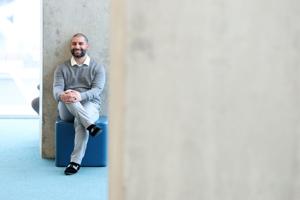It began with a torn meniscus. When first-year university student Ary Safakish twisted his knee at a preseason tournament, his dream of playing varsity soccer was suddenly dashed. But the damage went beyond the pitch.
The injury signaled the start of an academic tailspin that saw a once-solid-B student fail out of Guelph, then blow a second chance. “That was one of the first dominoes in my struggle,” says Safakish. “I had so many eggs in the soccer basket.

” But chances don’t always end at two. And 15 years on, the former university student has a story to share that might be the kind of message that anxious students, counting down to final exams or agonizing over admission offers, need to hear: the pathway to success is not always a straight line. In Canada, nearly three-quarters of young people will attain a post-secondary qualification .
But academic , social or financial hurdles can easily derail that plan. According to Statistics Canada, by the end of first-year university, 10 per cent of students have withdrawn from their studies , and that number grows over the duration of a degree. Even more feel the weight of such a decision: a 2022 survey found 40 per cent of Canadian post-secondary students have seriously considered dropping out.
“Setbacks do not define one’s potential,” says Fahim Quadir, president of the Canadian Association for Graduate Students. “On the contrary, they shape one’s trajectory.” Quadir, who is also vice-provost and dean at Queen’s University, said he has witnessed many inspiring examples of students who “did not, or could not, always follow a predetermined roadmap.
Instead, they explored alternative options, made significant adjustments to their career and academic plans, and persevered. What matters most is tenacity, curiosity and the determination to keep moving forward even when the path ahead is filled with profound levels of uncertainty.” Safakish’s story is a powerful reminder of that.
At age seven, he immigrated from Iran with his father, mother and younger brother. He attended elementary school in Toronto and split his high school years between Kingston — where his dad, a physician, had gone to seek recertification in order to work here — and London, where the family settled after his father signed on to practise in Chatham. There were no red flags in Safakish’s early education to signal the academic challenges to come.
He found school easy. Report cards were full of Bs, with a few As and Cs sprinkled in. He was big into soccer and basketball.
In Grade 12, he earned grades above 80 per cent in all six of his courses. But he didn’t quite know what he wanted to do next. He longed to be a professional soccer player.
He considered doing a victory lap, which would allow him to play another year of high school sports, but his parents, who he describes as always having ambitions for him without applying too much pressure, counselled otherwise. So, in 2009, he decided to go to the University of Guelph to study biology, partly because he liked science, partly because his parents were in the health-care profession (his mother is a dietician), but mostly because a friend was going there, too. Safakish moved into residence early to try out for the Gryphons, but his subsequent injury made the thrill of making the varsity soccer team short-lived.
Then he failed to log in on time for course registration and got stuck with all 8 a.m. classes, most of which he just didn’t end up attending.
“I didn’t realize how difficult it would be to be in a social setting with other people your age and to be responsible and go to bed on time. It was a huge challenge for me.” He played basketball and hung out with floormates who also skipped lectures.
“It wasn’t so much that I couldn’t handle the knowledge,” he says, “I didn’t actually put in an effort.” When the first of his fall term finals came around, Safakish handed in his exam after just 20 minutes: it was blank. He failed all four courses.
Guelph put him on probation. He didn’t tell his mom and dad. But when he then failed the winter term and the university directed him to withdraw, he couldn’t keep the secret any longer.
“It was a difficult time,” he says. “Obviously I didn’t want to disappoint my parents.” Guelph gave him an option to take two semesters off and enrol in a couple of online courses; if he did well, he could reapply to the university.
That worked. He got back in, and while he attended class more frequently, it didn’t help that he surrounded himself with people who lacked direction, including a roommate and a girlfriend who were also on academic probation. In the end, he couldn’t meet the required grades.
He had to withdraw again. “I was even more ashamed than the first time because I had a second chance, and I basically messed it up.” He took a minimum-wage job on the front desk of the YMCA and continued to take a few online courses in what would be a failed attempt to regain admission to Guelph.
At the Y, observing his long-serving co-workers, he began to wonder if this was his future: “I was having a midlife crisis at the age of 21.” He decided he had to start from scratch. He ditched the roommate, the girlfriend and the city.
He moved back in with his parents who had since settled in Richmond Hill. They told him they would support his choices but no longer hold his hand. That’s when continuing education threw him a lifeline.
He stumbled onto Toronto Metropolitan University’s R. Raymond Chang School of Continuing Education, which mainly offers certificate programs to adult learners but also bridging opportunities to a degree. There is no formal admission process, and students can sign up for as many courses as they like, at a time and in a format that makes sense for them.
“Our mandate is accessible and flexible learning,” says Dean Linda Koechli. “It’s part of making education work for a diverse group of students. We try and meet them where they are.
” For Safakish, that meant enrolling in three in-person evening courses, which required him to get on the GO train and make the long commute downtown, under the auspices of his parents who knew his schedule and kept him to it. “Suddenly my life went from no structure to lots of structure.” He did well and applied to study full-time at TMU for fall 2013.
He wasn’t accepted into the biology program he wanted, but the university offered him a seat in medical physics. “At that point, I wasn’t going to be picky; I’d take anything..
.I just wanted to get my degree to prove to my parents that I wasn’t a failure.” But Safakish took to the subject.
By third year, he knew he wanted to go on to graduate studies to secure a residency and work in the field of radiology and cancer treatment. He chose TMU over an Irish university for his masters, and continued there into his PhD, where his research focused on creating machine learning models that predict cancer treatment outcomes based on pre-treatment scans of patient tumours. Along the way, he moved out of his parents’ place and in with a girlfriend who would become his wife.
They would have a daughter. “I obviously wish I hadn’t made all those mistakes,” says the now 33-year-old looking back on his circuitous journey. “But I can’t have regrets when I met my wife because I failed out of Guelph, and I found my career path in physics because I failed out of Guelph; and I wouldn’t have had my daughter if I hadn’t failed out of Guelph.
” Still, he always worried his past would haunt him — his failures permanently on his transcript. But rather than run from it, he used it to illustrate his resiliency, even during interviews for a clinical residency. Safakish landed one of two positions at Thomas Jefferson University Hospital in Philadelphia.
The day after successfully defending his thesis last June, Safakish packed up his wife and one-year-old daughter and moved to the U.S. He visited Toronto this week, dropping by TMU to share his experiences with physics students, and to celebrate the Persian new year with family.
But being home is a reminder that the near-completion of his academic journey is bittersweet. His dad died of COVID in 2022, having ignored a cough that eventually landed him in the ICU. “At least he got to see my turnaround,” says Safakish.
“He knew I was on the right track, that I was going to be OK.”.
Top

He failed out of university twice. His path to a PhD was anything but straight

A torn meniscus derailed Ary Safakish’s university career, but 15 years later, his story shows how setbacks can lead to unexpected outcomes.









